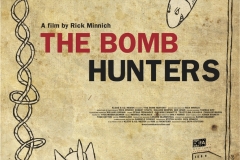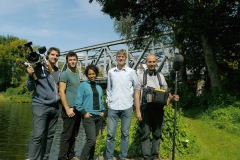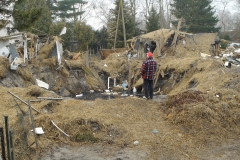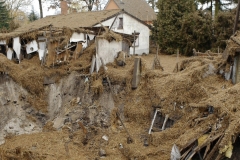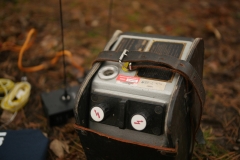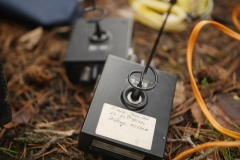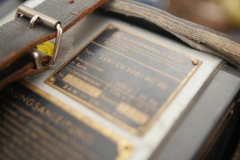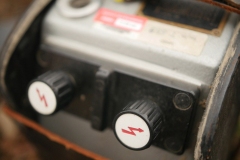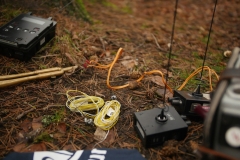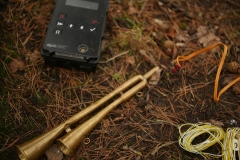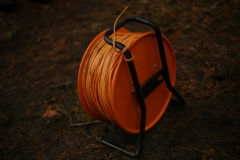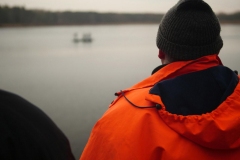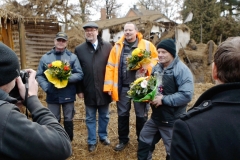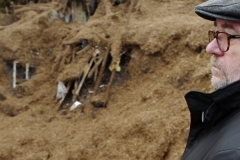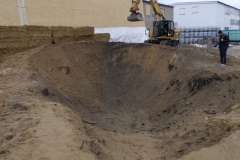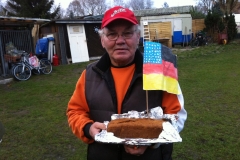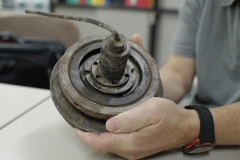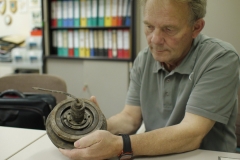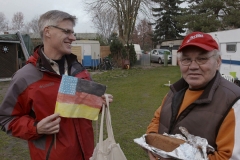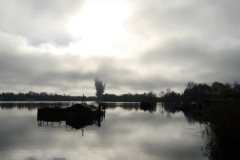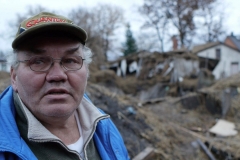An estimated 100,000 undetonated bombs from World War II still lurk beneath the surface in Germany nearly 70 years after the war ended. Most have mechanical fuses and will explode only upon impact (such as during construction work). But hundreds of these bombs, including over 300 in Oranienburg, have long-delay fuses, which were designed to not explode immediately, but several hours or days later. This was to frighten the populace from entering bombed out locations to clean up the ruins. Due to the geological situation in Oranienburg, these long-delay fuse bombs turned upward underground, preventing the normal chemical reaction from taking place. Instead, the acetone fumes in the fuse have been slowly but surely eating away at the thin celluloid membrane holding back the firing pin which would lead to a detonation.
Meanwhile, these fuses have become so sensitive that the bombs can no longer be moved and in most cases cannot be defused. The only remaining options: search for and explode the bombs under controlled conditions, or ignore the situation and hope for the best. Mayor Hans-Joachim Laesicke and the leaders of Oranienburg have chosen the first option – Oranienburg is the only city in Germany which is systematically searching for bombs.
Searching for the bombs entails drilling 6 meter deep (20 feet) holes every 1.5 meters (5 feet) and lowering magnetic resonance probes into the earth to search for metallic objects. The logistics and expense of the undertaking are enormous, but the potential results of not taking action are even more frightening.
As Mayor Laesicke himself often repeats, Germany started the war, and the Allied bombings of Oranienburg helped free the city of Nazi terror. But the methods used not only helped bring an end to a dictatorship, but also severely impacted the general populace for generations to come.
World War II may be long over, but its legacy lives on in Oranienburg in a particularly devious manner. What does this have to say about the millions of tons of ordinance the USA has spread throughout Asia, Europe, the Middle East and Latin America since then? Will future generations be as equally or even more severely affected by unexploded ordinance (UXO) for decades to come?
“The Bomb Hunters” is not only an action-packed story the search for undetonated bombs in the small German town of Oranienburg. It is also a cautionary tale about the long-term impact of war that raises the painful but unavoidable question: What are we doing to our planet … and to ourselves?
CAST
Paule Dietrich, Hans-Joachim Laesicke, Rick Minnich, Heino Bochert, André Müller, Horst Reinhardt, and Michael Reisewitz
CREW
Directed by Rick Minnich
Screenplay: Rick Minnich
Camera: Robert Staffl, Rick Minnich
Editing: Robin Lach
Sound: César Hernández, Giovanni Zaninotto, Tsvetelina Valkova, Ewan Dryburgh
Music: Michael Mühlhaus
Production: Stefan Kloos, Rick Minnich, Kloos & Co. Medien GmbH / RBB/ Rickfilms
Rental: http://www.riseandshine-berlin.de/portfolio_page/bomb-hunters/
Rick Minnich is an American independent filmmaker based in Berlin, Germany. His award-winning films include: HEAVEN ON EARTH (IDFA 2001), HOMEMADE HILLBILLY JAM (Hot Docs 2005), FORGETTING DAD (IDFA – Special Jury Award 2008), THE BOMB HUNTERS (2015). Currently he is working on THE STRAIT GUYS (about the proposed Bering Strait tunnel project) and MR. GREENFIELD (about Holocaust survivor and presidential tailor Martin Greenfield). Visit him at www.rickfilms.de.
Filmography (selection)
1993 DELPHI 1830, Experimentalfilm, 16mm, colour, 3′
1994 Beim nächsten mal wird alles besser, Kurzspielfilm, 16mm, colour, 9′
1993-96 The Book of Lenins, Dokumentarfilm, 16mm, colour, 24’
1996 Bild ohne Titel, Kurzspielfilm, 35mm, Dolby SR, col., 4’, HFF/ARTE
1997 Good Guys & Bad Guys (Nette Jungs & böse Buben), Dokumentarfilm, Super 16mm, Dolby SR, colour, 73’, HFF/ORB
2001 Heaven on Earth, Dokfilm, S16mm, Dolby SR, colour, 52’, HFF/Hoferichter & Jacobs GmbH
2005 Homemade Hillbilly Jam, Dokfilm, S16mm, colour, 80’, Hoferichter & Jacobs GmbH, DVD erschienen bei EpixMedia AG (Dt.) und First Run Features (USA)
2008 Forgetting Dad, Dokfilm, HD, farbe/SW, 83’ (ZDF-Das kleine Fernsehspiel, Red. Christian Cloos / Hoferichter & Jacobs GmbH / Rickfilms), Prädikat: besonders wertvoll, Premiere: IDFA-Joris Ivens Competition, Special Jury Award. Kinostart Deutschland: 3.6.10 im Verleih von W-Film. Vorauswahl Deutscher Filmpreis 2011
2015 Bombenjäger, Dokfilm, HD, farbe, 52’ (RBB, Kloos & Co. Medien GmbH / Rickfilms)
2018 Der Schneider der Präsidenten, Dokfilm, 4K, 30’ (MDR, InOneMedia)
As an American who has lived in the land of the ‘conquered enemy’ for the thirty years, it is still difficult for me to imagine how my grandfather’s generation could be responsible for each new nail-biting bomb find in 21st century Germany. The bombs seems like a grotesque and delayed act of revenge against the Nazis by my fellow Americans. It is almost as though the Germans may never be released from their ghastly past, which suddenly becomes tangible every time the discovery of a new bomb is announced on the morning news, and tens of thousands of people are forced to leave their homes.
Such news items often come from Oranienburg. During one of these controlled detonations one-and-a-half years ago, I interviewed Mayor Hans-Joachim Laesicke for the first time. He struck me as a feisty underdog who was doing battle against the federal government’s bureaucratic defence mechanisms with lots of humor and gusto. His fight to free Oranienburg’s soil of bombs is a kind of David and Goliath story I cannot resist. When Mayor Laesicke told me about a letter he once received from an American bomber pilot, I knew immediately that I had to make a film about Laesicke and his battle against the bombs. In the letter, the pilot apologized for the countless bombs he dropped on Oranienburg during World War II. Wrapped inside the letter was a $100 bill – a touching gesture of reconciliation from the former enemy. Mayor Laesicke gave the money to the heroes of today – the bomb disposal experts, who risk their lives day in and day out in their struggle to free their city of the increasingly dangerous bombs. The mayor thanked the pilot, but also wrote that there is no need to apologize. After all, his bombing raids helped liberate the Germans from the Nazi terror.
What an anachronistic scenario: a German mayor in 2014 has the ‘liberating bombs’ from 1945 dug up and neutralized in order to finally free the residents of his city from the fateful Nazi terror silently looming beneath the surface. Mayor Laesicke, the three bomb disposal experts and the bomb victim Paule Dietrich will embody these historical embroilments. By placing them and their tireless battle to free their city of its bombs at the center of the film, I aim to make a thrilling piece about the Germans and their past, to which I have a unique approach as a long-time resident of Germany and ‘heir to the victors’.
PRESS
Smithsonian Magazine – “There are Still Thousands of Tons of Unexploded Bombs in Germany, Left Over From World War II” by Adam Higginbotham, January 2016
Der Stern – “Unter Oranienburg liegen noch 300 scharfe Bomben” by Katharina Link, 10 March 2015
“The United States Just Bombed Germany” by David Swanson, 3 May 2016
MOZ.de – “Bis heute fordert der Krieg seinen Opfer” by Klaus D. Grote, 28 February 2015
Märkische Allgemeine – “Oranienburgs Bombenjäger im Fernsehen” – by Robert Teiler, 6 March 2015



